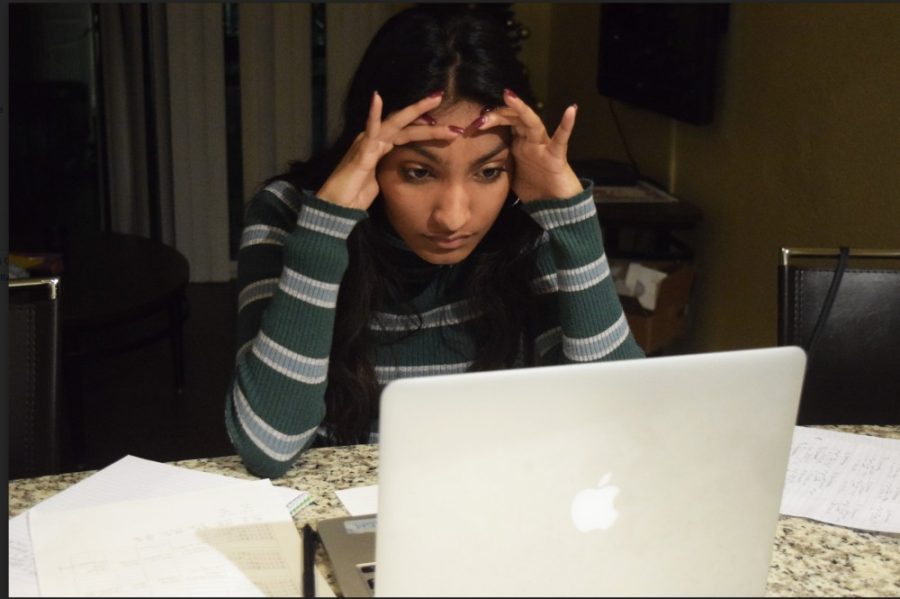It should come as no surprise that anxiety disorders are the most common mental illness in the United States. The Anxiety and Depression Association of America has stated that anxiety disorders are affecting approximately 40 million adults in the U.S. This translates to having 18.1 percent of the United States population being diagnosed, with only 36.9 percent of that cohort receiving treatment.
As for stress, it is evident that this semester has not aided students in that department. According to the American Psychological Association, “The average reported stress level for U.S. adults related to the [COVID-19] pandemic is 5.9″ — out of 10, in which 10 is the most stressed. Now think about the increase of stress for students in pandemic conditions.
To show some contrast, the same type of study was conducted back in 2019 by the American Psychological Association. They reported that “this is significantly higher than the average stress level reported in the 2019 Annual Stress in America survey, which was 4.9, and [this] marks the first significant increase in average reported stress since the survey began in 2007.”
The adaptation of online learning has not been easy for some students, thus the added stress and anxiety have been taking a toll on those affected. Each person has their own tolerance for stress and anxiety, and it is vital that those around them understand their needs. Whether it relates to family, health or school, each stressor makes an impact on a student’s focus and ability to perform well.
Ashley Jordan is a professor for psychology and a director of Online Programs at the University of Arizona. According to Jordan, there is no doubt in her mind that students are more stressed this fall compared to last fall. She went on to say that she believes most students would say that they are extremely stressed. She predicted that most students would rate their stress between an eight out of 10 and a 10 out of 10, with 10 being the most stressed.
On the other hand, Eve Isham, an assistant professor and a cognition and neural systems director at the UA, said she believes that predicting how stressed or how much anxiety someone has is not that simple. Isham said that each student responds differently to the COVID-19 situation, thus there are students who would say they are adapting well. And others would be the most stressed they have ever been.
RELATED: Childhood vaccination rates drop to alarmingly low rates amidst global pandemic
Isham gave advice on how to approach professors on the matter of stress or anxiety. “We have a very caring and understanding faculty here at the University of Arizona,” Isham said. “I know that many of my colleagues in the psychology department set up their classes to be very accommodating and flexible.”
If further accommodation is needed, “students should speak with their professors. On this note, I would also encourage the students to talk with their instructors in-person (e.g., Zoom) instead of over email. It would help establish a stronger personal connection and may help alleviate stress or anxiety,” Isham said.
Jordan expressed a similar route when exploring what to do when students need more time on assignments. Her advice was that, “they should contact their professors and TA’s or preceptors. They should contact their academic advisors. And they should build support networks for themselves in their personal lives, as well.”
Having a connection and support group will make seeking out help more accessible when needed. No matter what struggles students are enduring, they should not be taken lightly. The bottom line is that students should not be afraid to ask for help or extra time when it is truly needed.
As for recommendations for how to manage stress and anxiety, Jordan recommended that students should take care of their mental health first. “If you’re struggling with it, everything else is going to suffer, too. You may want to speak to an academic advisor to find out options for temporarily going part-time or reducing course load, particularly if the student has experienced an increase in caregiving or other at-home responsibilities,” Jordan said.
There are also a variety of resources available to help with coping mechanisms. For one, the Centers for Disease Control and Prevention has a guide on tips to lower stress levels.
The number of psychological impacts due to the pandemic can range greatly, and this published journal called “The psychological impact of quarantine and how to reduce it: rapid review of the evidence” explores how to manage specific stressors.
Isham and Jordan both said they believe that a person’s mental health and physical health are important. Isham said, “depression and anxiety could lead to unhealthy daily routines, low sleep quality, poor hygiene, as well as lowering the immune system.”
There is a cycle that could be made and due to the pandemic keeping millions of people indoors, some bad habits might be harder to break.
Follow Briana Aguilar on Twitter









